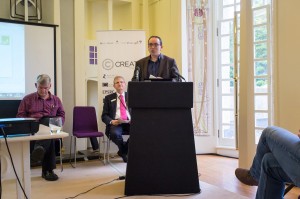
From left: Liz Dowthwaite, Victoria Stobo, Estelle Derclaye, Ben Pester, Sarah Kember and Christian Geib
University of Glasgow PhD candidate Megan Blakely reports on CREATe Results: Books, Publishing, Archives and Libraries session at the September CREATe All Hands Conference.
The Books, Publishing, Archives, and Libraries Panel, chaired by Ben Pester from Goldsmiths, University of London, featured speakers with a variety of perspectives on the theme. The session overall provided excellent overviews of progress on CREATe projects as well as valuable industry feedback.
Professor Sarah Kember, also from Goldsmiths, kicked off the session with a discussion related to copyright and publishing, Whose Book is it Anyway?. The research focuses on hopes and fears through studying psychological, political, and cultural reactions to technology and copyright. Prof. Kember is exploring the impact of peer review and free labour, citation issues, gender and feminist perspectives in publishing as well as the effect on business models.
Professor Estelle Derclaye from the University of Nottingham spoke about open access academic publishing and the findings of the large literature review scope for her in-progress project. Derclaye found fifteen gaps in existing research such as a thorough historical perspective on open access academic publishing and different incentives for different academic outputs. Futher, Derclaye updated the group on an interdisciplinary stakeholder workshop on the subject.
PhD student Liz Dowthwaite also from Nottingham moved the conversation along to web comics and an examination of crowdfunding. Web comic artists depend on web platforms and survive by driving traffic to their website and self-publishing to subvert industry norms, and Dowthwaite’s research also explores creative media to build communities that can provide funding for creative work to continue.
University of Glasgow PhD student Victoria Stobo’s research focuses on archives and digitisation with an emphasis on copyright and risk. Her project involves empirical research on archives and access and draws on similar international research from Canada, the United States, and Australia. Further, she updated the group on the Wellcome Library mass digitisation project for which she served as research assistant, and the digitisation model is now being adopted by the Glasgow School of Art. Stobo also noted upcoming CREATe projects related to a University of Glasgow Edwin Morgan digitisation diligent search simulation and a National Library of Scotland partnership.
PhD student Christian Geib from the University of Strathclyde explained how text and data mining has the potential for prima facie violation of copyright in many international legal systems’ right to reproduction. However, statutory exceptions may allow for text and data mining. In particular, the April 2014 statutory update that allows for copies of lawfully accessed text and data analysis for non-commercial research may be useful but is still limited by the legal language – restrictions to ‘lawful access’ and ‘non-commercial research’. Lastly, Geib pointed out the legal uncertainty surrounding permanency when determining whether a copy has been made during a technological transaction.

Edinburgh University Press’ John Watson, watched by Author Ken McLeod and Darryl Mead of the National Library of Scotland
The respondent panel was opened by author Ken McLeod, who shared his experiences of finding unauthorised electronic copies of his works online and emphasised how creative operate in a world that lawyers and legal philosophers have designed, leading to ideological responses to unique creative issues. He suggested that intellectual property law should focus on the material of social relations rather than evangelise the principles behind the law.
Darryl Mead of National Library of Scotland followed, and relayed useful information about the many challenges with copyright and libraries as well as reflecting upon the individual presentations. Additionally, Mead suggested that libraries could benefit from a proper dialog surrounding these issues with publishers.
Finally, John Watson of the Edinburgh University Press responded by pointing to publishers’ evolving policies towards open access and ebooks and challenges in adapting to new tech markets. He additionally suggested that perhaps we’ve forgotten the importance of the physical object (e.g. valuable first editions and paper copies that offer illustrations, fonts, and style that adds value to the physical form).
